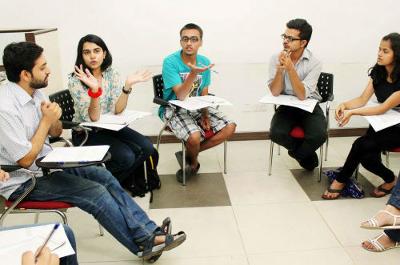It is a waste of time to try and divide the educational world into “more progressive” and “more traditional” tendencies, although many gurus make a lot of money and get a lot of airtime doing this.
Here are some Myths about education.
Teachers Are the Most Important Influence on a Child’s Education
Research indicates that less than 30 percent of a student’s academic success is attributable to schools and teachers. The one’s that influence are socioeconomic status, followed by the neighbourhood, the psychological quality of the home environment, and the support of physical health provided.
Homework Boosts Achievement
In Finland, students have higher achievement with little or no homework and shorter school hours. Important factor is what students experience during the school day. Project-based learning, as one example, places the emphasis on what is done during the day.
Class Size Does Not Matter
Research evidence strongly indicates that a decrease in the number of students has a qualitative pedagogical impact. When reductions occur in elementary classrooms, evidence has shown that the extra individualised attention and instruction appear to make it more likely for these students to graduate at higher rates from high school.
Type of School Does Not Matter
Whether you belong from a private school or government school it hardly matter’s. The knowledge gained has greater role than the kind of school.
Children Learn Better When You Cater To Their Learning Style
According to one popular learning styles theory, some kids prefer visual learning, others prefer auditory learning, and kinesthetic like to learn while moving around. Intuitively, it makes sense to cater for these different styles of learning. However, research shows that this is not the case. Rather, reviews of independent research show that catering to learning styles is at best a waste of time, and at worst, a strategy that has a negative impact on learning.
Money Doesn’t Matter
It is a popular argument that, while we are spending more money than ever, test scores remain stagnant. This is a destructive myth widely shared by those who oppose better funding of our schools. Yet the research is clear. When school districts with sufficient resources are compared with those without, achievement outcomes are definitively higher in the wealthier districts.
College Admissions Are Based on Academic Achievement And Test Scores
Berliner and Glass’ findings are disturbing. Many colleges and universities practice admissions by category. One example is athletics. The most significant variable at 30 of the most selective universities was discovered to be legacy (whether a family member previously attended the university). Wealthy parents who contribute development funds further increase the likelihood of admission. This doesn’t mean that universities don’t pay attention to student achievement in their admissions process. It does mean that there is preferential treatment in admissions that relegates academic accomplishments to a lower priority.
Merit Pay for Teachers Improves Student Performance
The full argument is that merit pay is a good way to increase teacher performance, because teachers should be evaluated on the basis of student performance, and rewarding or punishing schools for student performance will improve our nation’s schools. However, evidence suggests that competition between teachers is counterproductive and interferes with collaboration. Measuring teacher effectiveness is very difficult, and no simple measures effectively do this.


